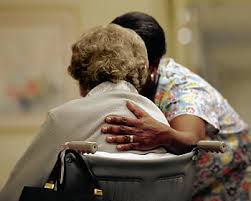
Trauma Workers At-Risk for Compassion Fatigue
The expectation of unending compassion for others is unrealistic. For trauma workers, hearing devastating stories can take its toll. This can be seen in detrimental effects to physical and emotional health; that is, a specific type of burnout called compassion fatigue.
The Trauma & Mental Health Report recently spoke with compassion fatigue specialist and director of Compassion Fatigue Solutions in Kingston, Ontario, Françoise Mathieu, to discuss the symptoms of the condition and how trauma workers can protect themselves from it.
Q: What is compassion fatigue?
A: It is a gradual shift and decline in an individual’s ability to feel empathy and compassion towards others. It is not an illness or disorder. Often, the term compassion fatigue is used interchangeably with vicarious trauma or secondary traumatic stress (STS), but there is a distinction.
STS refers to a traumatic, stressful experience without direct exposure to the trauma. STS results from hearing traumatic stories, like hearing witness testimonies or stories of torture. Over time, those stories can shift your view of the world to a tainted and jaded one, to the point where you lose the ability to experience joy. For example, people who work with victims of sexual trauma may have a hard time trusting babysitters or coaches. Vicarious trauma is the result of the accumulation of several STS experiences.
Q: Who is susceptible to compassion fatigue, vicarious trauma, and STS?
A: Helping professionals are the most susceptible. This typically includes physicians, nurses, mental health care workers, allied health professionals, therapists, clergy, law enforcement, teachers, long term care workers, and personal support workers.
The public can also start internalizing trauma from continuous exposure to graphic images portrayed by the media. Overexposure of the September 11th, 2001 terrorist attacks created a heightened sense of danger and paranoia. The difference is that the relationship helping professionals form with their clients is very unique: You become deeply vulnerable. When you’re opening your heart and listening to someone’s pain, it can be very intense.
Q: Are there any signs and symptoms of compassion fatigue?
A: A major warning sign is workaholism. Many helping professionals are so dedicated to their jobs that they don’t have a balance between their work and home lives. The more caring you are, the more vulnerable you are. We call it a “normal consequence” of doing a good job. Helping professionals may experience a decline in empathy, reduced collegiality, dreading client appointments, and belittling their stories.
Or, someone might be doing a great job at work, but they have nothing left to give at home. Warning signs are irritability, social isolation, emotional and physical exhaustion, or self-medicating with drugs, alcohol, or even excessive shopping.
Q: What can protect trauma workers?
A: With increased budget cuts, many trauma workers do not have adequate training, so Trauma Informed Training can be highly protective. Richard Harrison and Marvin Westwood, researchers from the University of British Columbia (UBC), studied experienced trauma therapists and found that those who connected spiritually or creatively with something outside their work and felt supported by their families and communities managed well with the stress of their jobs.
Establishing a deep therapeutic alliance characterized by a meaningful relationship with clients, based on presence and heartfelt concern, also provided professional satisfaction.
Q: What can a person with compassion fatigue do to alleviate symptoms?
A: We can’t prevent compassion fatigue, but there are strategies and tools for professionals to be able to feel grounded, present in the moment, and well trained. Ask yourself these questions:
–Do I work somewhere where I have control? Control over your schedule can reduce compassion fatigue. Small changes can make a big difference.
–Do I have a debriefing process that might relieve some of the emotional strain?
–Do I have access to supportive people whom I can consult with, when I hear difficult stories?
–Am I trained in trauma-related concepts, so that I have a better understanding of the side effects?
–Do I have a transition ritual, a way to leave work behind and transition into my home life? (e.g., yoga, exercise)
Last, research shows that the most effective strategy is Mindfulness-Based Stress Reduction, which recommends relaxation techniques to reduce stress and improve self-compassion.
Mathieu adds that even if you have your own past history of trauma, it doesn’t mean that you shouldn’t be a helping professional. In this case, it’s important to identify your triggers, ensure you have a support system, and that your caseload doesn’t remind you of your personal trauma.
Mathieu cautions the trauma worker to “pay equal attention to the needs of your client, and yourself.”
–Shira Yufe, Contributing Writer





